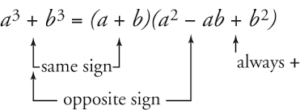An accomplished professor of art history teaches an introductory undergraduate course. He has recently published his third scholarly article on Byzantine architecture. His textbook on the subject is ahead of schedule. Yet he spends the majority of his 50-minute lecture brutalizing his students about their poor exam results. “How are you still unable to articulate the differences between Manét and Monet?” he cries. His students remember their professor’s disappointment and disillusionment long after they can no longer distinguish the “Bar at the Folies-Bergere” from the lily pads.

Monet

Manet
Across campus, an engineering lecturer humiliates her first-year calculus students. Apparently, some of the 18-year-olds have forgotten the formula for the sum of two cubes. “This is from first year algebra, people!” she intones. “Nobody gets a job designing nuclear submarines who can’t factor polynomials.” Her derision has predictable results: the students who already know the formula feel superior; the ones who don’t remember how to factor are not inspired to review.

Or on the first day of law school a professor queries an unprepared student. “I don’t know,” says the 23-year-old. “Here is a dime” the professor replies. “Go call your mother. Tell her you will never be a lawyer.” The student remembers the public humiliation for the rest of her life.
On the first day of organic chemistry class, the professor says, “look to the left and right of you. Those students will not be here to take the final.” As expected, students drop out after each exam. “We have standards,” the professor explains. “As it happens, you just don’t meet them.”

The art history professor, the engineering lecturer, the law professor, and the chemistry professor meet in the faculty lounge. They complain and commiserate. How can their students be so unprepared, so unmotivated, so blindingly—there’s no other word for it—stupid? “Who the heck is working in admissions?” they grumble in unison. “How is it even possible that this first year class is the worst ever? Did their parents take drugs in college? Are the students themselves stoned in class?”

Were these same situations played out in the schoolyard, we would call it what it is: bullying. When a bigger, stronger, older kid intimidates a classmate, teachers help the tormentor understand that it’s not okay to harass smaller kids. But when professors humiliate students, the debasement is called “rigor.” Elementary school teachers understand that bullies frequently have self esteem-issues. Oppressors have to constantly quash others to be able to see themselves as superior. Is there a similar dynamic in play for the professors? If they were confident in their abilities as scholars and as pedagogues, wouldn’t they be gracious about their instruction? Most good professors are confident in themselves and their abilities. They don’t have to prove anything to anyone. Bad teachers should not give unprepared students passing grades; but they don’t have to degrade them either.

Don’t misunderstand: I want my doctor to be blindingly fluent in organic chemistry; I insist that the engineers designing bridges know the formula for the difference of two cubes and much more; I feel strongly that my lawyer be able to think on her feet. The professionals on whom I rely should be the best, the brightest, the most competent. I’m just not sure they get that way by being yelled at. I don’t think college students study harder and more effectively as a result of being threatened and insulted. I suspect the successful students achieve in spite of rather than because of the mortification. I also think that we only hear the stories of those who survived. The kids who “couldn’t take it” and dropped out aren’t the ones saying, “Yeah, the professors were vicious but I persevered and now I’m designing nuclear submarines.”

I would argue that sarcasm and intimidation have no place in classrooms—or in healthy families either. Children—even compared to students—have little power. Children have limited influence on what they eat or when they sleep. They can’t control much in their environment. Every thermostat is out of reach. All kids can do is cry and hope somebody figures out what’s wrong. Are they hungry, wet, tired, or scared? Is somebody going to make this right?

You catch more flies with honey than with vinegar, but who wants a collection of pestilent insects? Manipulation is bested by connection every time. Support is more effective than intimidation. Meeting your kids where they are with support rather than shame is the better way to point them in the direction of successful careers and content lives. Yelling at people–especially little people who depend on you–may be indicative of what is missing in your life, rather than what can be added to theirs.



One thought on “When Will They Ever Learn?”
You couldn’t be more wrong about this. If a law student shrinks away from being berated, he or she will not succeed in court or in negotiating a contract? If a doctor can’t focus on his or her patient in the midst of chaos, screaming families and blood soaked floors, he or she should not be a doctor? My training was in the military. If I couldn’t stand someone screaming in my face about some irrelevant bullshit, how could I focus on keeping my troops alive in the midst of battle?
I wouldn’t want a doctor, lawyer or military commander who spent his or her college years cowering in their safe spaces. Neither should you.